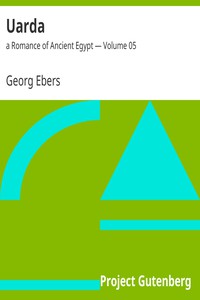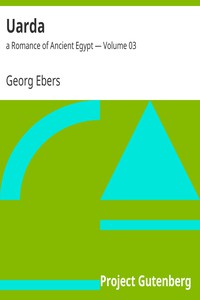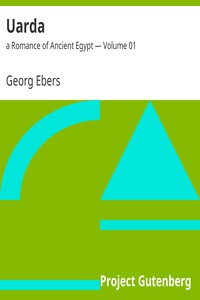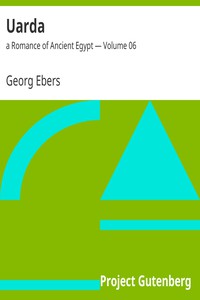Uarda : a Romance of Ancient Egypt — Volume 05 by Georg Ebers (novels to improve english .TXT) 📗

- Author: Georg Ebers
Book online «Uarda : a Romance of Ancient Egypt — Volume 05 by Georg Ebers (novels to improve english .TXT) 📗». Author Georg Ebers
In a court-yard, protected from the rays of the sun only by an awning, was a large walled bason, containing a solution of natron, in which the bodies were salted, and they were then dried in a stone vault, artificially supplied with hot air.
The little wooden houses of the weavers, as well as the work-shops of the case-joiners and decorators, stood in numbers round the pattern-room; but the farthest off, and much the largest of the buildings of the establishment, was a very long low structure, solidly built of stone and well roofed in, where the prepared bodies were enveloped in their cerements, tricked out in amulets, and made ready for their journey to the next world. What took place in this building—into which the laity were admitted, but never for more than a few minutes—was to the last degree mysterious, for here the gods themselves appeared to be engaged with the mortal bodies.
Out of the windows which opened on the street, recitations, hymns, and lamentations sounded night and day. The priests who fulfilled their office here wore masks like the divinities of the under-world. Many were the representatives of Anubis, with the jackal-head, assisted by boys with masks of the so-called child-Horus. At the head of each mummy stood or squatted a wailing-woman with the emblems of Nephthys, and one at its feet with those of Isis.
Every separate limb of the deceased was dedicated to a particular divinity by the aid of holy oils, charms, and sentences; a specially prepared cloth was wrapped round each muscle, every drug and every bandage owed its origin to some divinity, and the confusion of sounds, of disguised figures, and of various perfumes, had a stupefying effect on those who visited this chamber. It need not be said that the whole embalming establishment and its neighborhood was enveloped in a cloud of powerful resinous fumes, of sweet attar, of lasting musk, and pungent spices.
When the wind blew from the west it was wafted across the Nile to Thebes, and this was regarded as an evil omen, for from the south-west comes the wind that enfeebles the energy of men—the fatal simoon.
In the court of the pattern-house stood several groups of citizens from Thebes, gathered round different individuals, to whom they were expressing their sympathy. A new-comer, the superintendent of the victims of the temple of Anion, who seemed to be known to many and was greeted with respect, announced, even before he went to condole with Rui's widow, in a tone full of horror at what had happened, that an omen, significant of the greatest misfortune, had occurred in Thebes, in a spot no less sacred than the very temple of Anion himself.
Many inquisitive listeners stood round him while he related that the Regent Ani, in his joy at the victory of his troops in Ethiopia, had distributed wine with a lavish hand to the garrison of Thebes, and also to the watchmen of the temple of Anion, and that, while the people were carousing, wolves
[Wolves have now disappeared from Egypt; they were sacred animals, and were worshipped and buried at Lykopolis, the present Siut, where mummies of wolves have been found. Herodotus says that if a wolf was found dead he was buried, and Aelian states that the herb Lykoktonon, which was poisonous to wolves, might on no account be brought into the city, where they were held sacred. The wolf numbered among the sacral animals is the canis lupaster, which exists in Egypt at the present day. Besides this species there are three varieties of wild dogs, the jackal, fox, and fenek, canis cerda.]
had broken into the stable of the sacred rams. Some were killed, but the noblest ram, which Rameses himself had sent as a gift from Mendes when he set out for the war—the magnificent beast which Amon had chosen as the tenement of his spirit, was found, torn in pieces, by the soldiers, who immediately terrified the whole city with the news. At the same hour news had come from Memphis that the sacred bull Apis was dead.
All the people who had collected round the priest, broke out into a far- sounding cry of woe, in which he himself and Rui's widow vehemently joined.
The buyers and functionaries rushed out of the pattern-room, and from the mummy-house the taricheutes, paraschites and assistants; the weavers left their looms, and all, as soon as they had learned what had happened, took part in the lamentations, howling and wailing, tearing their hair and covering their faces with dust.
The noise was loud and distracting, and when its violence diminished, and the work-people went back to their business, the east wind brought the echo of the cries of the dwellers in the Necropolis, perhaps too, those of the citizens of Thebes itself.
"Bad news," said the inspector of the victims, cannot fail to reach us soon from the king and the army; he will regret the death of the ram which we called by his name more than that of Apis. It is a bad—a very bad omen."
"My lost husband Rui, who rests in Osiris, foresaw it all," said the widow. "If only I dared to speak I could tell a good deal that many might find unpleasant."
The inspector of sacrifices smiled, for he knew that the late superior of the temple of Hatasu had been an adherent of the old royal family, and he replied:
"The Sun of Rameses may be for a time covered with clouds, but neither those who fear it nor those who desire it will live to see its setting."
The priest coldly saluted the lady, and went into the house of a weaver in which he had business, and the widow got into her litter which was waiting at the gate.
The old paraschites Pinem had joined with his fellows in the lamentation for the sacred beasts, and was now sitting on the hard pavement of the dissecting room to eat his morsel of food—for it was noon.
The stone room in which he was eating his meal was badly lighted; the daylight came through a small opening in the roof, over which the sun stood perpendicularly, and a shaft of bright rays, in which danced the whirling motes, shot down through the twilight on to the stone pavement. Mummy-cases leaned against all the walls, and on smooth polished slabs lay bodies covered with coarse cloths. A rat scudded now and then across the floor, and from the wide cracks between the stones sluggish scorpions crawled out.
The old paraschites was long since blunted to the horror which pervaded this locality. He had spread a coarse napkin, and carefully laid on it the provisions which his wife had put into his satchel; first half a cake of bread, then a little salt, and finally a radish.
But the bag was not yet empty.
He put his hand in and found a piece of meat wrapped up in two cabbage- leaves. Old Hekt had brought a leg of a gazelle from Thebes for Uarda, and he now saw that the women had put a piece of it into his little sack for his refreshment. He looked at the gift with emotion, but he did not venture to touch it, for he felt as if in doing so he should be robbing the sick girl. While eating the bread and the radish he contemplated the piece of meat as if it were some costly jewel, and when a fly dared to settle on it he drove it off indignantly.
At last he tasted the meat, and thought of many former noon-day meals, and how he had often found a flower in the satchel, that Uarda had placed there to please him, with the bread. His kind old eyes filled with tears, and his whole heart swelled with gratitude and love. He looked up, and his glance fell on the table, and he asked himself how he would have felt if instead of the old priest, robbed of his heart, the sunshine of his old age, his granddaughter, were lying there motionless. A cold shiver ran over him, and he felt that his own heart would not have been too great a price to pay for her recovery. And yet! In the course of his long life he had experienced so much suffering and wrong, that he could not imagine any hope of a better lot in the other world. Then he drew out the bond Nebsecht had given him, held it up with both hands, as if to show it to the Immortals, and particularly to the judges in the hall of truth and judgment, that they might not reckon with him for the crime he had committed—not for himself but for another—and that they might not refuse to justify Rui, whom he had robbed of his heart.
While he thus lifted his soul in devotion, matters were getting warm outside the dissecting room. He thought he heard his name spoken, and scarcely had he raised his head to listen when a taricheut came in and desired him to follow him.
In front of the rooms, filled with resinous odors and incense, in which the actual process of embalming was carried on, a number of taricheutes were standing and looking at an object in an alabaster bowl. The knees of the old man knocked together as he recognized the heart of the beast which he had substituted for that of the Prophet.
The chief of the taricheutes asked him whether he had opened the body of the dead priest.
Pinem stammered out "Yes." Whether this was his heart? The old man nodded affirmatively.
The taricheutes looked at each other, whispered together; then one of them went away, and returned soon with the inspector of victims from the temple of Anion, whom he had found in the house of the weaver, and the chief of the kolchytes.
"Show me the heart," said the superintendent of the sacrifices as he
approached the vase. "I can decide in the dark if you have seen rightly.
I examine a hundred animals every day. Give it here!—By all the Gods of
Heaven and Hell that is the heart of a ram!"
"It was found in the breast of Rui," said one of the taricheutes decisively. "It was opened yesterday in the presence of us all by this old paraschites."
"It is extraordinary," said the priest of Anion. "And incredible. But perhaps an exchange was effected.—Did you slaughter any victims here yesterday or—?"
"We are purifying ourselves," the chief of the kolchytes interrupted, for the great festival of the valley, and for ten days no beast can have been killed here for food; besides, the stables and slaughterhouses are a long way from this, on the other side of the linen-factories."
"It is strange!" replied the priest. "Preserve this heart carefully, kolchytes: or, better still, let it be enclosed in a case. We will take it over to the chief prophet of Anion. It would seem that some miracle has happened."
"The heart belongs to the Necropolis," answered the chief kolchytes, "and it would therefore be more fitting if we took it to the chief priest of the temple of Seti, Ameni."
"You command here!" said the other. "Let us go." In a few minutes the priest of Anion and the chief of the kolchytes were being carried towards the valley in their litters. A taricheut followed them, who sat on a seat between two asses, and carefully carried a casket of ivory, in which reposed the ram's heart.
The old paraschites watched the priests disappear behind the tamarisk bushes. He longed to run after them, and tell them everything.
His conscience quaked with self reproach, and if his sluggish intelligence did not enable him to take in at a glance all the results that his deed might entail, he still could guess that he had sown a seed whence deceit of every kind must grow. He felt as if he had fallen altogether into sin and falsehood, and that the goddess of truth, whom he had all his





Comments (0)